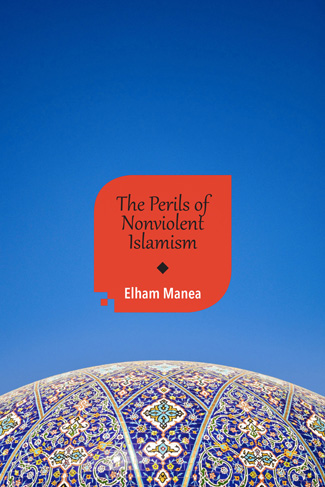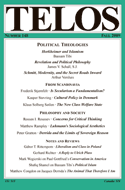By Telos Press · Tuesday, February 23, 2021 To read more in depth from Telos, subscribe to the journal here.
Writing at the Investigative Project on Terrorism website, Phyllis Chesler reviews Elham Manea’s The Perils of Nonviolent Islamism, now available from Telos Press. Save 20% off the list price when you purchase your copy in our store.
An excerpt of the review:
 In The Perils of Nonviolent Islamism, her fourth book in English, the University of Zurich political scientist, author, activist, and consultant offers a warning to the West. In The Perils of Nonviolent Islamism, her fourth book in English, the University of Zurich political scientist, author, activist, and consultant offers a warning to the West.
In Manea’s view, “nonviolent Islamism” is the basic building block that leads to violent jihad. And our misreading of that reality can lead to real harm.
If we continue “cancelling” politically incorrect ideas and speech, continue “vilifying dissent,” and “insisting upon the infinite guilt of the West” then, as Russell A. Berman writes in the foreword to this work, “we should expect the real-world consequences of this ideology soon to become clearer and rougher.” Manea believes that repressing dissent can easily turn into repressive practices. “Cancel culture” may indeed be our “Islamism.”
Nonviolent Islamism’s insidious nature is one of Manea’s most important points. Westerners have been hopelessly gullible in their choice of “smiling and patient” Saudi-funded Muslim Brotherhood/Salafi representatives as their go-to experts on both Islam and Muslims.
“One cannot combat an ideology and fundamentalism by working with the very groups that promote that ideology,” she writes. Further, Western cultural relativism and doctrines of “multiculturalism” has served us and freedom-loving Muslims very, very poorly.
This battle, she writes, is “the global challenge of the 21st century.”
Continue reading →
By Elham Manea · Monday, November 9, 2020 Elham Manea teaches Political Science at the University of Zurich. Her forthcoming book The Perils of Nonviolent Islamism will be published by Telos Press in the spring and can be pre-ordered today in our store. The following talk was delivered as a keynote speech in German at the Convention of the Schader Foundation in Darmstadt (online) on November 6, 2020.
It is becoming difficult lately to turn on the news. And I do not just mean the American presidential elections. The year 2020 was and still is a hard one. COVID-19 has dominated our lives with its limitations. But it has also welded people together in every corner of the world in the fight against a persistent and ultimately deadly virus. This struggle, this common challenge, has united us and yet divided us. We are still irritated by the lockdowns, afraid of their economic repercussions, and divided in our ideological fronts. Times like these are worrying and provide fertile ground for conspiracy theorists and right-wing and left-wing extremist groups.
In times like these, our societies can all too easily become polarized, and we run the risk of being trapped in a discourse of division, trapped in identity boxes. “Us” versus “Them.”
Continue reading →
By Caroline Valentin · Thursday, September 28, 2017 The following essay was originally published in French at Le Figaro Vox on July 14, 2017, and is published here by permission. Translated by Russell A. Berman.
In the night of April 4, 2017, in Paris, Sarah Halimi, a 65-year-old Jewish woman, was savagely killed. Her murderer, Kobili Traoré, a radicalized Muslim with a Malian background and a long police record, assaulted her for forty minutes, first in her living room and then on her balcony. He shouted “Allah Akbar,” while degrading his victim, called her a “fat whore” and a “shaitan” (a demon in Arabic). From their windows and later from the courtyard, several neighbors heard and then witnessed, in disgust, the massacre. In Noémie Halioua’s excellent article in Causeur, she reports the testimony of one of them: “First I was woken by the moans of a creature in suffering. It was torture. First, I thought it was an animal or a baby. But then, lifting the blinds and opening the window, I recognized that it was a woman moaning as she was being beaten. With each blow, I heard a moan; she did not even have the strength to cry out anymore.” Kobili Traoré strikes her so hard that his fist is swollen. When he sees the light of the police flashlights in the courtyard, he yells, “watch out, there is a woman here about to commit suicide,” as he seizes his victim, still alive, by her wrists and throws her over the banister of her balcony. Sarah Halimi lays in the courtyard, dead, covered in blood.
Continue reading →
By Diego Bermejo · Thursday, July 28, 2016 The process of secularization is insufficient if, voided of its original pathos, it leads to any form of sacralization of the immanence. Secularism becomes insufficient, if not harmful, in the same way as religious fundamentalism, if it becomes an obstacle to building pluralistic coexistence. Therefore, secularism should acknowledge the emergence of religious challenges. Religion has found, in the crisis of reason (metaphysical, scientific, and political), an opportunity not only to be present in the public sphere, but also to demand the right to equal treatment—appealing to the same democratic principles of secularism—and the right to political participation. Secularism cannot respond to these challenges with another form of “enlightened fundamentalism.”
Continue reading →
By Michael Millerman · Tuesday, April 30, 2013 As an occasional feature on TELOSscope, we highlight a past Telos article whose critical insights continue to illuminate our thinking and challenge our assumptions. Today, Michael Millerman looks at Frederik Stjernfelt’s “Secularism is Fundamentalism! The Background to a Problematic Claim,” from Telos 148 (Fall 2009). Frederik Stjernfelt and Jens-Martin Eriksen’s The Democratic Contradictions of Multiculturalism is also available from Telos Press in our online store.
 What Leo Strauss demonstrated in his studies on the foundations and crisis of liberalism—an achievement that continues to bring both honor and infamy to his name—recurs in the guise of an unsolved problem in both the popular press and in learned company as a debate over the question of whether secularism is what it ostensibly opposes: a rigid fundamentalism. In these circles, the question is provoked less by purely theoretical considerations than by such utterances in the public sphere as are bound to infuriate a sect’s opponents, or confirm them in their suspicions: the Christian American Family Association‘s director of issues analysis refers to “secular fundamentalists” as “the American Taliban”; Quebec Cardinal Marc Oullet, who had a chance to become Rome’s new Pope, complains of “secular fundamentalism” and the “dictatorship of relativism” when defending the Catholic faith; the inquisitor Simon Blackburn quips that a recent book by an established and respected philosopher, who questions the materialistic atheism of the day, ought to be blacklisted as prohibited reading. What Leo Strauss demonstrated in his studies on the foundations and crisis of liberalism—an achievement that continues to bring both honor and infamy to his name—recurs in the guise of an unsolved problem in both the popular press and in learned company as a debate over the question of whether secularism is what it ostensibly opposes: a rigid fundamentalism. In these circles, the question is provoked less by purely theoretical considerations than by such utterances in the public sphere as are bound to infuriate a sect’s opponents, or confirm them in their suspicions: the Christian American Family Association‘s director of issues analysis refers to “secular fundamentalists” as “the American Taliban”; Quebec Cardinal Marc Oullet, who had a chance to become Rome’s new Pope, complains of “secular fundamentalism” and the “dictatorship of relativism” when defending the Catholic faith; the inquisitor Simon Blackburn quips that a recent book by an established and respected philosopher, who questions the materialistic atheism of the day, ought to be blacklisted as prohibited reading.
Continue reading →
|
|
In The Perils of Nonviolent Islamism, her fourth book in English, the University of Zurich political scientist, author, activist, and consultant offers a warning to the West.
 What Leo Strauss demonstrated in his studies on the foundations and crisis of liberalism—an achievement that continues to bring both honor and infamy to his name—recurs in the guise of an unsolved problem in both the popular press and in learned company as a debate over the question of whether secularism is what it ostensibly opposes: a rigid fundamentalism. In these circles, the question is provoked less by purely theoretical considerations than by such utterances in the public sphere as are bound to infuriate a sect’s opponents, or confirm them in their suspicions: the
What Leo Strauss demonstrated in his studies on the foundations and crisis of liberalism—an achievement that continues to bring both honor and infamy to his name—recurs in the guise of an unsolved problem in both the popular press and in learned company as a debate over the question of whether secularism is what it ostensibly opposes: a rigid fundamentalism. In these circles, the question is provoked less by purely theoretical considerations than by such utterances in the public sphere as are bound to infuriate a sect’s opponents, or confirm them in their suspicions: the 

